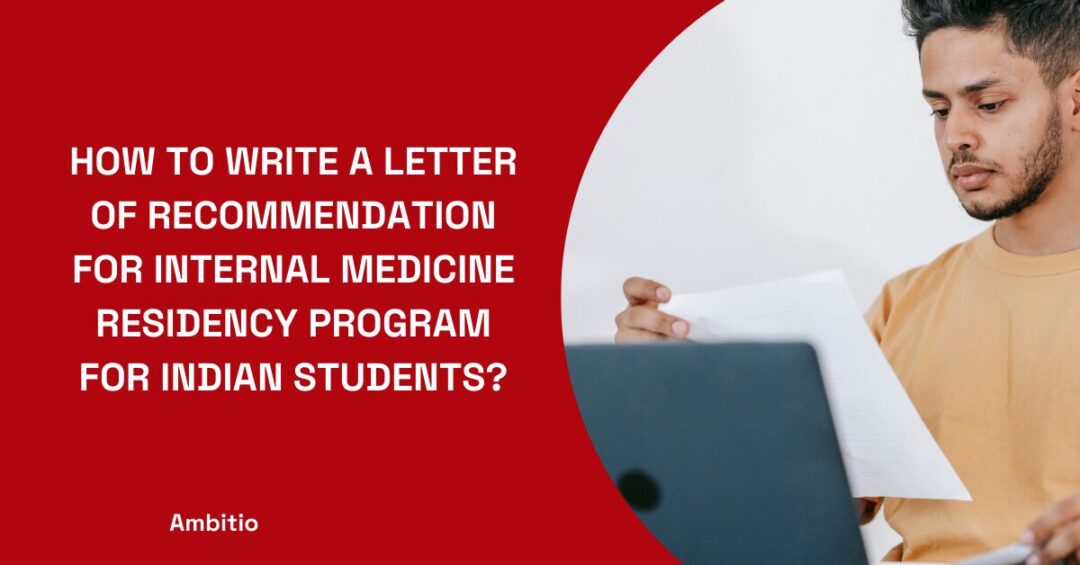14 July 2025
6 minutes read
How To Write A Letter Of Recommendation For Internal Medicine Residency Program For Indian Students?

Key Takeaways
- Letter of recommendation for internal medicine residency plays a major role in helping applicants stand out in a highly competitive match process
- Show real clinical examples, not generic praise, to prove the applicant’s fit for internal medicine
- Include accurate ERAS logistics like letter request form and unique letter ID to avoid disqualification
Only 7% of internal medicine residency applicants match with their top-choice residency programs — and a well-written letter of recommendation can be the deciding factor in a competitive residency application. Yet, most residency letters of recommendation are painfully generic, filled with clichés, or written by a letter writer who barely recalls the medical student’s clinical experience during their clerkship.

That’s how talented applicants — with solid medical knowledge, stellar clinical skills, and great work ethic — get overlooked in the ERAS application pool. If you’re writing an LOR for an internal medicine residency program, this isn’t just about praising a medical graduate; it’s about crafting the highest recommendation grounded in real patient care, clinical rotations, and how well the student is prepared for primary care, fellowship, or even becoming a future fellow.
Why Do You Require An Internal Medicine Residency Letter Of Recommendation?
No matter how many hours you spent memorizing cytokine cascades or diagnosing fake patients during your clinical rotations, none of that matters if your advisor doesn’t write a halfway-decent letter of recommendation. In the eyes of residency programs, your CV, MSPE, and IM USMLE score are just checkboxes.
What really sells you is how someone senior describes your conduct, professionalism, and fit for the specialty. Especially if you’re an international medical student, this letter is not just a formality — it’s your translator, hype man, and credibility pass rolled into one. Here’s why it’s non-negotiable:
1. It’s Your Personality Check — Without the Personality Test
Residency programs don’t just want smart students; they want humans who’ll survive 28-hour shifts without snapping. A strong LOR gives insight into your conduct, attitude, and how you actually function in a real medical school setting — beyond your polished CV or generic MSPE.
2. It Validates Your Clinical Maturity
Especially for an international medical student, there’s often skepticism about the depth of clinical experience abroad. A powerful letter from a U.S.-based physician proves that you’ve adapted to their system, thrived in high-pressure teams, and handled real specialty-level responsibilities in internal medicine.
3. It Fills the Gaps Your MSPE and CV Can’t
Your MSPE might talk about your grades and medical school ranking, and your CV lists your research or volunteering — but none of it captures how you handle uncertainty, interact with patients, or respond to criticism. That’s where the LOR shines: it humanizes your stats.
4. It Speaks Volumes When Your USMLE Doesn’t
Let’s face it: not everyone kills their IM USMLE. If you’re not a 260+ scorer, a glowing recommendation can balance the scales. It tells the program director, “Sure, this student didn’t ace the test — but they’re sharp, teachable, and clinically strong.”
5. It Builds a Case for Your Fit in the Specialty
Internal medicine is broad, nuanced, and brutally demanding. A tailored LOR helps programs understand why this specialty aligns with your long-term goals, how you’ve demonstrated commitment during rotations, and whether you’ve got what it takes to become a leader — or even a fellow someday.
6 Must Have Elements For Recommendation Letter For Internal Medicine Residency Programs
A strong letter of recommendation for a residency position isn’t about praising someone endlessly with vague adjectives like “hardworking” or “nice.” Program directors aren’t looking for saints — they want team players who can survive code blues, make significant contributions, and still crack a joke at 3AM. If you’re asked to write a LOR for the residency application process, this is not the time to recycle old recommendation samples or copy-paste from a portal template.

You’re vouching for someone’s entry into one of the most intense training programs in the U.S. Here’s exactly what your letter needs to have:
1. A Specific Example That Brings the Applicant to Life
Avoid generic fluff. Instead, share a specific example where the applicant showed resilience, adaptability, or handled treatment plans with insight and confidence. If they impressed you as a first-year, a chief resident, or while shadowing an attending physician, mention it. Program directors don’t just want compliments — they want proof.
2. Clearly Tied Career Goals & Fit for Internal Medicine
Whether you’re a tutor, supervisor, or attending, connect the applicant’s strengths to their career goals. Does their behavior align with what’s expected in programs in the United States? Did they show the kind of compassionate, analytical thinking IM demands? Don’t just endorse — explain why they belong.
3. Commentary on Interpersonal Skills in Real Work Environments
How did the applicant function in actual work environments? Were they collaborative? Did they show initiative? Describe how they built rapport with patients and staff. Highlight interpersonal abilities — because medicine isn’t practiced in a vacuum, and attendings want someone who can integrate smoothly.
4. Acknowledgment of Academic Timeline & Medical Maturity
Reference how long you’ve known the applicant — mention whether it was during their years of medical school, in a training program, or under your direct supervision. This helps validate their growth and allows you to comment on their development in a way program directors may value deeply.
5. Accuracy With ERAS Logistics — No Rookie Mistakes
Use the letter request form properly, reference the unique letter ID, and ensure you’re submitting letters through the MyERAS portal. If the applicant chose to waive their right to view the letter, respect that boundary. Many great letters go ignored simply because they weren’t submitted correctly.
6. Language That Reflects Strength Without Overkill
A well-written letter strikes a balance between genuine praise and realism. Avoid sounding forced. Instead, say things like: “In my 10 years supervising students, this applicant stood out for their ability to diligently manage complex cases while remaining empathetic.” This is how you write a strong LOR that leaves a mark during residency interviews and boosts their admission chances.
What Other Documents You Need To Get Into Internal Medicine Residency Programs?
LOR is everything?
Well… not everything. It’s important — but it won’t get you into an internal medicine residency program alone. Think of it like this: your letter of recommendation is the handshake. The rest? That’s your paperwork, your test scores, your story, and your strategy. Whether you’re a U.S. medical graduate or an international medical student, here’s a quick breakdown of what you really need beyond the LOR.
| Document/Exam | Required? | Who Needs It? | Purpose |
|---|---|---|---|
| ERAS Application | ✅ Yes | Everyone | Core residency application form submitted via MyERAS |
| Letters of Recommendation (LORs) | ✅ Yes | Everyone | Minimum of 3 (at least 1 in internal medicine strongly recommended) |
| Medical School Transcript | ✅ Yes | Everyone | Academic record — must be official and uploaded |
| MSPE (Dean’s Letter) | ✅ Yes | Everyone | Evaluation of performance across years of medical school |
| USMLE Step 1 & Step 2 CK | ✅ Yes | U.S. & International Students | Required by all programs in the United States medical universities |
| ECFMG Certification | ✅ Yes | International Medical Graduates | Confirms degree equivalency for U.S. training |
| Personal Statement | ✅ Yes | Everyone | Your story, career goals, and interest in internal medicine comes in statement of purpose or personal statement |
| CV (Curriculum Vitae) | ✅ Yes | Everyone | Snapshot of your professional journey |
| TOEFL/IELTS | ⚠️ Maybe | Non-native English speakers (program-dependent) | TOEFL/IELTS is a Proof of English proficiency for international medical students |
| GRE/GMAT | ❌ No | Not required for residency | GRE/GMAT are only for certain MPH/MBA dual programs — not residency |
| ACT/SAT | ❌ No | Not relevant | ACT and SAT are undergrad-level exams — completely unnecessary |
| Duolingo English Test | ❌ Rarely | Very few programs may consider it | TOEFL/IELTS preferred; Duolingo rarely accepted in ERAS |
Conclusion
At the end of the day, a letter of recommendation for an internal medicine residency isn’t just a box to check — it’s one of the few chances you have to stand out as a real person, not just a score or CV line. And writing one? It’s not about sounding impressive. It’s about being honest, thoughtful, and specific.
So, write it like you mean it — because someone’s future might just depend on it.
But if you want an expert, who knows what universities like to see in you. Who has written 1000s of LORs and who writes personalized Letter of Recommendation then you should book a call with Ambitio. Firstly, it is completely free consultation and secondly – they give you the right roadmap.
FAQs
What is an internal medicine residency program abroad?
It is a postgraduate training program where international medical graduates (IMGs) gain practical clinical experience in internal medicine in a foreign country, often required for licensing and practice there
How long does an internal medicine residency abroad typically last?
Residency duration varies by country but usually ranges from 3 to 4 years, such as 3 years in the U.S. and 4 years in some programs like Aga Khan University in Nairobi
Can international medical graduates apply for internal medicine residency programs abroad?
Yes, IMGs are eligible to apply, but must meet specific requirements such as ECFMG certification for the U.S. and may need to complete observerships or clinical rotations locally before applying
What types of internal medicine residency tracks are available?
Common tracks include transitional, preliminary, categorical (3-year traditional), and primary care programs, each suited to different career goals
What exams are required to apply for internal medicine residency abroad?
Licensing exams vary by country: USMLE for the U.S., PLAB for the U.K., MCCQE for Canada, and language proficiency tests for non-English speaking countries like Germany or France
What documents are typically needed for the application?
Applicants usually need medical school transcripts, degree certificates, letters of recommendation, a CV, and a personal statement tailored to the program

You can study at top universities worldwide!
Get expert tips and tricks to get into top universities with a free expert session.
Book Your Free 30-Minute Session Now! Book a call now




























